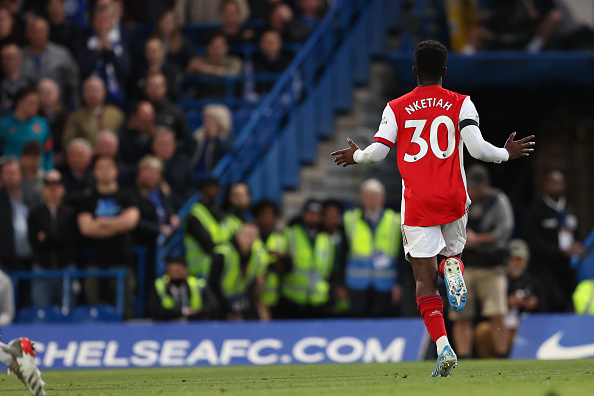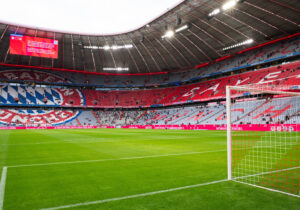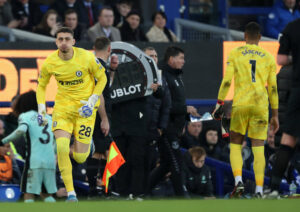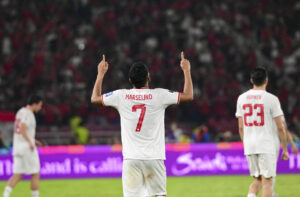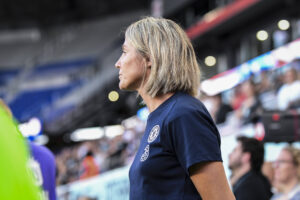Ever since Pierre-Emerick Aubameyang left Arsenal on the last day of the January transfer window without a replacement striker being bought in for him, Gunners fans have desperately hoped that someone from within the club can step up to replace the Gabonese and somehow score the goals to secure Champions League qualification. After scoring twice in Arsenal’s shock away win at Chelsea this week, could that man be Eddie Nketiah?
Of course, it will take a lot more than just a pair of goals, however well-taken, for Nketiah to prove that he can be the kind of late-season legend – a player who comes good at the end of a season to drive his club on to glory – that Arsenal have found at equally crucial times in the recent past. Nevertheless, the fact that Nketiah has finally found his goal-scoring form at the best possible time offers hope that he can emulate the strikers and wingers who have broken into an Arsenal team late on in a campaign and then propelled them to success.
Can Eddie Nketiah Become Another Late-Season Hero for Arsenal?
Kevin Campbell in 1991
Kevin Campbell in 1991 is the archetypal Arsenal late-season legend. He had actually made his debut for the Gunners nearly three years earlier, in May 1988 when he was only 18, but the Gunners’ first-choice strike pairing of Alan Smith and Paul Merson was so established and so prolific that he found his first-team chances limited for the next few seasons, even going out on loan to Leyton Orient and Leicester City.
In the spring of 1991, however, Campbell finally got his chance to have a prolonged run in the side, of the kind that Eddie Nketiah is hoping for now. He responded in extraordinary fashion, scoring eight times in the last 10 matches to secure the Gunners’ second league title in three seasons and become an instant cult hero.
Campbell’s Arsenal career never reached such giddy goal-scoring heights again, especially after the Gunners signed Ian Wright at the start of the following season, although he did continue to play for the club until 1995 and his transfer to Nottingham Forest. However, that brief, brilliant spell that secured the title in 1991 ensured that he will remain an Arsenal hero forever.
Freddie Ljungberg in 2002
There are considerable similarities between Kevin Campbell and Arsenal’s next late-season legend, Freddie Ljungberg. Like Campbell, Ljungberg had first played for Arsenal several years before his big breakthrough, signing for the club in 1998 after he had excelled for Sweden against England in a World Cup qualifier, and he was in and out of the side for the next couple of seasons without ever fully establishing himself as a potentially match-winning player.
Late in the 2001/02 season, however, Ljungberg finally proved his mettle for the Gunners, as he was instrumental in their securing of a second league and cup Double in four years and third overall.
Robert Pires had excelled on the left wing for Arsenal for most of that campaign, but the Frenchman missed the end of the season (and the World Cup that summer) after suffering a serious season-ending injury in an FA Cup win over Newcastle. However, Ljungberg almost instantly filled the gap, inspiring Arsenal to go on a long unbeaten run at the end of the season, which he capped perfectly by scoring their second goal in the 2-0 FA Cup Final win over Chelsea, just a few days before the Gunners completed a unique “cup and league” double by winning the title at Manchester United. In total, Ljungberg scored a superb 17 goals for the Gunners that season and the trademark “red flash” in his hair became the must-have look for many Arsenal fans.
Again like Campbell, Ljungberg arguably never repeated that kind of stellar form during the rest of his Arsenal career, which lasted until 2007. Nevertheless, that goal-scoring run at the end of the 2001/02 season, like that of Campbell more than a decade earlier, saw his side over the line, and not just to winning one trophy but two.
Jose Antonio Reyes in 2004
Jose Antonio Reyes’s efforts for Arsenal at the end of the 2003/04 “Invincibles” season were not quite as spectacular as those of Ljungberg two years earlier or those of Campbell in 1991, but he was still the kind of invaluable late-season addition, even to a side as exceptional as the Invincibles, that endeared him to Arsenal fans.
After Reyes signed for Arsenal from Sevilla in January 2004, it appeared that the Gunners’ forward line was a potent combination of the past (Dennis Bergkamp, who was a veteran by that stage), the present (Thierry Henry, who was still at his imperious best) and the future, in the form of Reyes. And even if that future was never as glorious as it had initially promised to be, resulting in Reyes returning to Spain in 2007, he still scored important goals at the end of the 2003/04 season, including a pair against Chelsea in an FA Cup match and goals in the last two league games of the season to ensure the team’s historic unbeaten status.
Tragically, Reyes died in a car crash in 2019, aged only 35. However, even though he had only briefly shone for the Gunners at the end of their greatest ever season, Arsenal fans always remembered him fondly and mourned his early passing.
Eddie Nketiah in 2022?
For Eddie Nketiah in 2022, the challenge is to try and match the season-altering efforts of Arsenal greats such as Campbell, Ljungberg and Reyes. It certainly will not be easy, but after finally breaking into the first team when Alexandre Lacazette contracted Covid, he has the perfect opportunity not only to secure Champions League qualification for Arsenal but a new contract for himself at the club.
Nketiah showed enough in the match against Chelsea to ensure that he should retain his place against Manchester United this weekend, even after Lacazette’s return from illness. The sheer pace, mobility and above all hunger for goals that he demonstrated at Stamford Bridge mean that he deserves an opportunity to try and wreak havoc against another unsettled and under-performing defence.
There is one important caveat, though. Perhaps Nketiah was particularly inspired to excel at Chelsea because he had been at Stamford Bridge as a youth player for nearly a decade before being released and eventually being picked up by Arsenal. His desire to show his old club what they had missed out on may mean that he can only perform so well against them. Now, he has to prove that he can score goals against other Premier League clubs and not just the one that broke his heart as a schoolboy. If he does, he has the chance to become another late-season legend for Arsenal.
Main Photo
Embed from Getty Images


